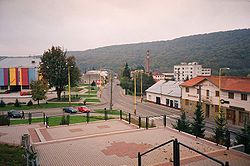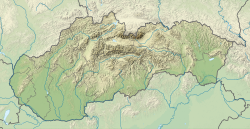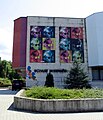Medzilaborce: Difference between revisions
A detail |
Some details |
||
| Line 91: | Line 91: | ||
==History== |
==History== |
||
The oldest written record connected with Medzilaborce dates back to 1543. The village first belonged to the Drugeth family, but passed to the Csáky family in the 17th century and later in the 19th century to the Andrássy family manor. As early as the 17th century, an important trade route passed through Medzilaborce connecting the interior of Slovakia with Poland through the [[Lupkov Pass]]. Medzilaborce became a town in 1860.<ref>{{cite web |url=http://www.medzilaborce.net/medzilaborce_1.htm |title=Medzilaborce |access-date=2007-10-01 |url-status=dead |archive-url=https://web.archive.org/web/20051124041555/http://www.medzilaborce.net/medzilaborce_1.htm |archive-date=2005-11-24 }} (Slovak)</ref> In 1873, construction of the train track between [[Humenné|Homonna]] (present-day Humenné) and Medzilaborce and further on to [[Galicia (Central Europe)|Galicia]] via the [[Lupkov Pass]], which contributed to the growth of the town from 724 inhabitants in 1851 to 1561 citizens in 1910. During [[World War I]], Russian troops entered the town in February 1915 and stayed there until May 1915, leaving the town significantly damaged. Before the establishment of independent [[Czechoslovakia]] in 1918, it was part of [[Zemplén County]] within the [[Kingdom of Hungary]]. In 1918 the town became part of Czechoslovakia. During the [[History of Czechoslovakia (1918–1938)|first Czechoslovak republic]], there was massive unemployment, and many people emigrated from the town. The town was significantly damaged again during [[World War II]], when 30% of the population of the city, consisting of Jewish Slovaks, were executed or sent to concentration camps. It was the seat of the district until 1960, when it was merged with the Humenné district. It has again been the seat of the Medzilaborce district since 1996. |
The oldest written record connected with Medzilaborce dates back to 1543. The village first belonged to the Drugeth family, but passed to the Csáky family in the 17th century and later in the 19th century to the Andrássy family manor. As early as the 17th century, an important trade route passed through Medzilaborce connecting the interior of Slovakia with Poland through the [[Lupkov Pass]]. Medzilaborce became a town in 1860.<ref>{{cite web |url=http://www.medzilaborce.net/medzilaborce_1.htm |title=Medzilaborce |access-date=2007-10-01 |url-status=dead |archive-url=https://web.archive.org/web/20051124041555/http://www.medzilaborce.net/medzilaborce_1.htm |archive-date=2005-11-24 }} (Slovak)</ref> In 1873, construction of the train track between [[Humenné|Homonna]] (present-day Humenné) and Medzilaborce and further on to [[Galicia (Central Europe)|Galicia]] via the [[Lupkov Pass]], which contributed to the growth of the town from 724 inhabitants in 1851 to 1561 citizens in 1910. During [[World War I]], Russian troops entered the town in February 1915 and stayed there until May 1915, leaving the town significantly damaged. Before the establishment of independent [[Czechoslovakia]] in 1918, it was part of [[Zemplén County]] within the [[Kingdom of Hungary]]. In 1918 the town became part of Czechoslovakia. During the [[History of Czechoslovakia (1918–1938)|first Czechoslovak republic]], there was massive unemployment, and many people emigrated from the town. From 1939 to 1944, Medzilaborce was part of the [[Slovak Republic (1939–1945)|Slovak Republic]]. The town was significantly damaged again during [[World War II]], when 30% of the population of the city, consisting of Jewish Slovaks, were executed or sent to concentration camps. On 26 November 1944, the [[Red Army]] and the [[1st Czechoslovak Army Corps in the Soviet Union|1st Czechoslovak Army Corps]] dislodged the [[Wehrmacht]] from Medzilaborce and it was once again part of Czechoslovakia. It was the seat of the district until 1960, when it was merged with the Humenné district. It has again been the seat of the Medzilaborce district since 1996. |
||
==Demographics== |
==Demographics== |
||
Revision as of 17:51, 22 June 2024
Medzilaborce | |
|---|---|
Town | |
 Medzilaborce main street | |
| Etymology: "people amidst the Laborec streams" | |
| Coordinates: 49°16′15″N 21°54′14″E / 49.27083°N 21.90389°E | |
| Country | |
| Region | Prešov |
| District | Medzilaborce |
| First mentioned | 1557 |
| Government | |
| • Mayor | Vladislav Višňovský |
| Area | |
• Total | 47.48 km2 (18.33 sq mi) |
| (2022) | |
| Elevation | 342[2] m (1,122[2] ft) |
| Population | |
• Total | 5,806 |
| • Density | 120/km2 (320/sq mi) |
| Time zone | UTC+1 (CET) |
| • Summer (DST) | UTC+2 (CEST) |
| Postal code | 068 01[2] |
| Area code | +421 57[2] |
| Car plate | ML |
| Website | www |
Medzilaborce (Template:Lang-rue, Midzhilabirtsyi; Template:Lang-uk, Mizhlabirtsi; Template:Lang-hu) is a town in northeastern Slovakia close to the border with Poland, located near the towns of Sanok and Bukowsko (in southeastern Małopolska). Its population is approximately 6,500.
Characteristics
It is an administrative and cultural centre of the Laborec Region. A train line connects it with the town of Humenné to the south and with Poland to the north. The private sector and service industries are developing quickly in the town at the moment.
It is home to the Andy Warhol Museum of Modern Art, opened in 1991, which contains many artworks and effects of Andy Warhol, his brother Paul and nephew James Warhola. Warhol's mother, Julia Warhola, was born and lived with her husband in the village of Mikó (today Miková), 17 kilometres (11 miles) to the west.
Medzilaborce is situated in one of the least developed regions of Slovakia. There are three churches in the town.
Geography
City parts:
The town of Medzilaborce lies in the valley of the Laborec river in north-eastern Slovakia. The hills of the surrounding Laborec Highlands are typical of this countryside.
History
The oldest written record connected with Medzilaborce dates back to 1543. The village first belonged to the Drugeth family, but passed to the Csáky family in the 17th century and later in the 19th century to the Andrássy family manor. As early as the 17th century, an important trade route passed through Medzilaborce connecting the interior of Slovakia with Poland through the Lupkov Pass. Medzilaborce became a town in 1860.[4] In 1873, construction of the train track between Homonna (present-day Humenné) and Medzilaborce and further on to Galicia via the Lupkov Pass, which contributed to the growth of the town from 724 inhabitants in 1851 to 1561 citizens in 1910. During World War I, Russian troops entered the town in February 1915 and stayed there until May 1915, leaving the town significantly damaged. Before the establishment of independent Czechoslovakia in 1918, it was part of Zemplén County within the Kingdom of Hungary. In 1918 the town became part of Czechoslovakia. During the first Czechoslovak republic, there was massive unemployment, and many people emigrated from the town. From 1939 to 1944, Medzilaborce was part of the Slovak Republic. The town was significantly damaged again during World War II, when 30% of the population of the city, consisting of Jewish Slovaks, were executed or sent to concentration camps. On 26 November 1944, the Red Army and the 1st Czechoslovak Army Corps dislodged the Wehrmacht from Medzilaborce and it was once again part of Czechoslovakia. It was the seat of the district until 1960, when it was merged with the Humenné district. It has again been the seat of the Medzilaborce district since 1996.
Demographics
In 1910 the town had 1,561 inhabitants, 677 Ruthenian, 501 German and 255 Hungarian. More than one third of the population (34.3%) were Jewish. The town had a high percentage of Rusyns before World War II.
According to the 2001 census, the town had 6,741 inhabitants. 56.42% of inhabitants were Slovaks, 34.16% Rusyns, 6.13% Ukrainian, 1.11% Roma and 0.68% Czechs.[5] The religious makeup was 41.15% Greek Catholics, 40.07% Orthodox, 4.94% people with no religious affiliation, 10.15% Roman Catholics and 0.33% Lutherans.[5]
Economy and infrastructure
Glass and machinery industry have the largest tradition in town Medzilaborce.
From 1970s it had been a branch of Jablonecke sklarne which had employ approximately 600 people in the glass industry. Company has stop its operations after privatization. Glass LPS has been now a follower of 45 years old tradition in glass industry in Medzilaborce and still manufacture crystal chandeliers and grind crystal trimmings.
In machinery industry in Medzilaborce it was Transporta, later Vihorlat which had 1200 employees. Privatization and crises had destroyed the whole factory. Nowadays companies Kovostroj and Labstroj continue in machinery industry.
Major employers

- Glass LPS Ltd.
- Kovostroj Inc.
- Labstroj Ltd.
Twin towns — sister cities
Medzilaborce is twinned with:[6][7]
 Náměšť nad Oslavou, Czech Republic
Náměšť nad Oslavou, Czech Republic Kozienice, Poland
Kozienice, Poland
Museum of Modern Art
Gallery
-
The Andy Warhol Museum of Modern Art
-
The Andy Warhol Museum of Modern Art
-
Statue of Andy Warhol
-
Orthodox church in the center of Medzilaborce
References
- ^ Statistical Office of the Slovak Republic (www.statistics.sk). "Hustota obyvateľstva - obce". www.statistics.sk. Retrieved 2024-02-08.
- ^ a b c d "Základná charakteristika". www.statistics.sk (in Slovak). Statistical Office of the Slovak Republic. 2015-04-17. Retrieved 2022-03-31.
- ^ Statistical Office of the Slovak Republic (www.statistics.sk). "Počet obyvateľov podľa pohlavia - obce (ročne)". www.statistics.sk. Retrieved 2024-02-08.
- ^ "Medzilaborce". Archived from the original on 2005-11-24. Retrieved 2007-10-01. (Slovak)
- ^ a b "Municipal Statistics". Statistical Office of the Slovak republic. Archived from the original on 2008-02-08. Retrieved 2008-02-17.
- ^ "Přátelství a spolupráce s městem Medzilaborce". namestnosl.cz (in Czech). Náměšť nad Oslavou. Retrieved 2019-09-05.
- ^ "Współpraca zagraniczna". kozienice.pl (in Polish). Kozienice. Retrieved 2019-09-05.
External links
 Media related to Medzilaborce at Wikimedia Commons
Media related to Medzilaborce at Wikimedia Commons- Official website

- Unofficial website of Medzilaborce (in Slovak)
- Medzilaborce: Modern art in a desolate town by Chris Togneri for the Spectacular Slovakia travel guide
- Catholic church of Byzantine rite in Medzilaborce
- The Andy Warhol Museum of Modern Art - city of origin
- Andy Warhol in Slovakia by Robert Rigney








